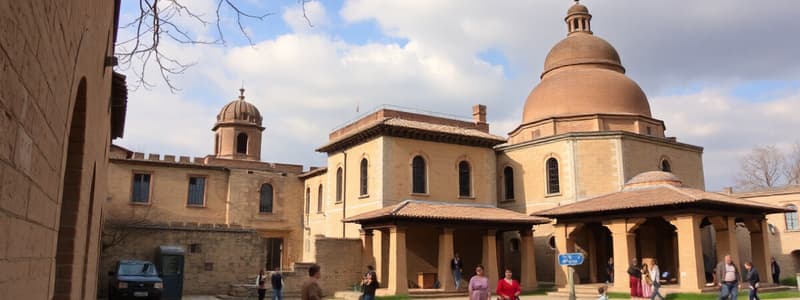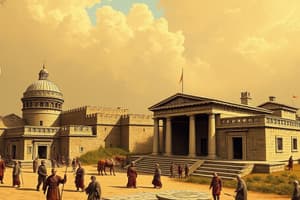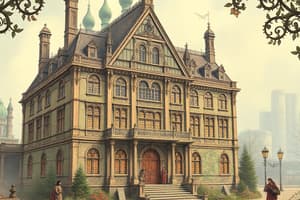Podcast
Questions and Answers
इतिहास कसा परिभाषित केला जातो?
इतिहास कसा परिभाषित केला जातो?
- फक्त दस्तऐवज व साहित्याचा अभ्यास
- भूतकाळातील इव्हेंट्सचा अभ्यास (correct)
- केवळ प्राचीन संस्कृतींचा अभ्यास
- आजच्या घटना आणि समाजाच्या संरचना
इतिहासाच्या कोणत्या कालखंडात लिहिलेल्या नोंदींचा अभ्यास केला जातो?
इतिहासाच्या कोणत्या कालखंडात लिहिलेल्या नोंदींचा अभ्यास केला जातो?
- पुरातन इतिहास (correct)
- आधुनिक इतिहास
- मध्ययुगीन इतिहास
- प्रागैतिहासिक काळ
इतिहासाचे कोणते महत्त्वाचे तत्त्व क्रोनोलोजी म्हणजेच घटनांची क्रीतीचा क्रम आहे?
इतिहासाचे कोणते महत्त्वाचे तत्त्व क्रोनोलोजी म्हणजेच घटनांची क्रीतीचा क्रम आहे?
- कव्हर्सशी संबंधित घटना
- ऐतिहासिक घटना आणि त्यांच्या कारणांचा अभ्यास
- घटनांच्या स्पष्टीकरणाचा अभ्यास
- घटनांचे अनुक्रमानुसार व्यवस्थापन (correct)
माध्यमाच्या पद्धतींचा समावेश कोणत्या प्रकारच्या स्रोतांमध्ये केला जातो?
माध्यमाच्या पद्धतींचा समावेश कोणत्या प्रकारच्या स्रोतांमध्ये केला जातो?
कौनता ऐतिहासिक व्यक्ति मंगोल साम्राज्याचा संस्थापक होता?
कौनता ऐतिहासिक व्यक्ति मंगोल साम्राज्याचा संस्थापक होता?
कुठल्या कालखंडात फ्यूडलिझम आणि चर्चाचा वाढ होता?
कुठल्या कालखंडात फ्यूडलिझम आणि चर्चाचा वाढ होता?
कौनती थीम ऐतिहासिक घटनांच्या समारंभाच्या समाजावर प्रभाव घालते?
कौनती थीम ऐतिहासिक घटनांच्या समारंभाच्या समाजावर प्रभाव घालते?
इतिहासाच्या कोणत्या साधनांचा वापर विश्लेषण व ज्ञान मिळवण्यासाठी केला जातो?
इतिहासाच्या कोणत्या साधनांचा वापर विश्लेषण व ज्ञान मिळवण्यासाठी केला जातो?
Flashcards are hidden until you start studying
Study Notes
Definition
- History is the study of past events, particularly in human affairs.
- It encompasses various disciplines like archaeology, anthropology, and sociology.
Importance of History
- Provides context for current events and societal structures.
- Helps understand cultural heritage and identity.
- Offers lessons from past successes and failures.
Major Periods in History
-
Prehistory
- Time before written records.
- Includes the Stone Age, Bronze Age, and Iron Age.
-
Ancient History
- Covers civilizations from the beginning of writing (circa 3000 BCE) to the fall of Rome (476 CE).
- Key civilizations: Mesopotamia, Egypt, Greece, Rome.
-
Medieval History
- From the fall of Rome to the beginning of the Renaissance (circa 500-1500 CE).
- Characterized by feudalism, the rise of the church, and the spread of Islam.
-
Modern History
- Begins with the Renaissance (14th century) to the present.
- Involves the Age of Exploration, Enlightenment, Industrial Revolution, and contemporary global issues.
Historical Methods
- Primary Sources: Original documents, artifacts, and firsthand accounts.
- Secondary Sources: Analyses and interpretations based on primary sources.
- Historiography: Study of how history has been written and interpreted.
Key Concepts
- Chronology: The arrangement of events in the order of their occurrence.
- Causation: Understanding the causes behind historical events.
- Continuity and Change: Identifying aspects that remained constant versus those that evolved over time.
Notable Historical Figures
- Alexander the Great: Conqueror of much of the ancient world.
- Julius Caesar: Key figure in the transition from Roman Republic to Empire.
- Genghis Khan: Founder of the Mongol Empire, known for military strategies.
- Mahatma Gandhi: Leader in India's non-violent independence movement.
Themes in History
- War and Peace: The impact of conflicts and resolutions on societies.
- Economics: The role of trade, agriculture, and industry in shaping civilizations.
- Religion: Influence of religious beliefs and institutions on cultures.
- Social Structures: Examination of class, gender, and race throughout history.
Sources of Historical Knowledge
- Books and Journals: Academic and narrative histories.
- Documentaries and Films: Visual interpretations of historical events.
- Museums and Archives: Physical collections of artifacts and documents.
Conclusion
- History is essential for understanding the world today and shaping future societies.
- It is an ongoing process of interpretation and understanding human experiences through time.
इतिहासाची व्याख्या
- इतिहास म्हणजे मानवी कामकाजातील भूतकाळातील घटनांचा अभ्यास.
- पुरातत्त्वशास्त्र, मानवशास्त्र, व समाजशास्त्र यांसारख्या विविध शास्त्रांचा समावेश केला जातो.
इतिहासाचे महत्त्व
- वर्तमान घटनांची आणि सामाजिक रचनेची पार्श्वभूमी प्रदान करतो.
- सांस्कृतिक वारसा आणि ओळख समजण्यास मदत करतो.
- भूतकाळातील यश आणि अपयशांमधून धडे मिळवतो.
इतिहासातील प्रमुख काळ
- पूर्वइतिहास
- लेखनपूर्वक काळ, जडणघडणीतून गडद व काळी वेळ यांचा समावेश.
- प्राचीन इतिहास
- लेखनाची शुरुआत (सुमारे 3000 BCE) आणि रोमचा पतन (476 CE) यामध्ये येते.
- प्रमुख संस्कृती: मेसोपोटामिया, इजिप्त, ग्रीस, रोम.
- माध्यमिक इतिहास
- रोमच्या पतनानंतर पुनर्जागरणाच्या सुरुवातीपर्यंत (सुमारे 500-1500 CE).
- सामंतवाद, चर्चाची वाढ, आणि इस्लामचा प्रसार याने वर्णित.
- आधुनिक इतिहास
- पुनर्जागरणापासून (14व्या शतक) वर्तमान काळापर्यंत.
- शोधयात्रा, प्रबोधन, औद्योगिक क्रांती आणि समकालीन जागतिक प्रश्न यांचा समावेश.
ऐतिहासिक पद्धती
- प्राथमिक स्रोत: मूळ दस्तऐवज, वस्त्र आणि प्रत्यक्ष अनुभव.
- द्वितीयक स्रोत: प्राथमिक स्रोतांवर आधारित विश्लेषण आणि व्याख्या.
- ऐतिहासिक लेखनशास्त्र: इतिहास व कसा लिहिला गेला आणि समजला गेला याचा अभ्यास.
महत्त्वाचे संकल्पना
- कालक्रम: घटनांचा अनुक्रमीतपणे व्यवस्थापन.
- कारणनिर्णय: ऐतिहासिक घटनांच्या मागील कारणांचा अभ्यास.
- सततता आणि बदल: स्थिर गोष्टींचा आणि कालानुसार बदललेल्या गोष्टींचा शोध.
महत्त्वाचे ऐतिहासिक आकडेवारी
- अलेक्झांडर द ग्रेट: प्राचीन जगाचा विजय.
- जुलियस सीझर: रोमन प्रजापतीत्वातून साम्राज्यात म्हणून संक्रमणातील प्रमुख व्यक्ती.
- गेंगिस खान: मंगोल साम्राज्याचा संस्थापक, लष्करी योजनांसाठी प्रसिद्ध.
- महात्मा गांधी: भारताच्या अहिंसक स्वातंत्र्य चळवळीत नेतृत्व.
इतिहासातील थीम
- युद्ध आणि शांतता: संघर्ष आणि समाधानांचा समाजावर प्रभाव.
- आर्थिक: व्यापार, कृषी, आणि उद्योग यांचा सांस्कृतिक विकासावर प्रभाव.
- धर्म: धार्मिक विश्वास व संस्थांचा सांस्कृतिक प्रभाव.
- सामाजिक संरचना: इतिहासभर वर्ग, लिंग, आणि वर्ण यांचे विश्लेषण.
ऐतिहासिक ज्ञानाचे स्रोत
- पुस्तके आणि जर्नल्स: अकादमिक आणि वर्णात्मक इतिहास.
- डॉक्युमेंटरीज आणि चित्रपट: ऐतिहासिक घटनांचे दृकश्राव्य रूपांतर.
- संग्रहालये आणि अभिलेखागार: वस्त्र आणि दस्तऐवजांचे भौतिक संग्रह.
निष्कर्ष
- इतिहास समजून घेतल्यास आजच्या जगाकडे पाहण्यास आणि भविष्याच्या समाजाची रचना करण्यास आवश्यक आहे.
- मानवी अनुभवांचा हा एक सतत विचार आणि समजण्याचा प्रक्रियेलाही अंगे दाखवतो.
Studying That Suits You
Use AI to generate personalized quizzes and flashcards to suit your learning preferences.




